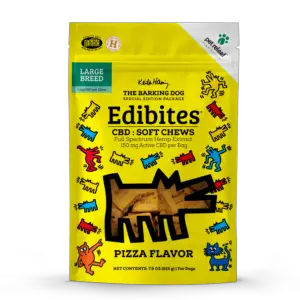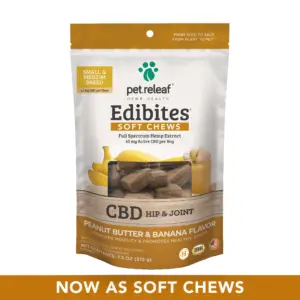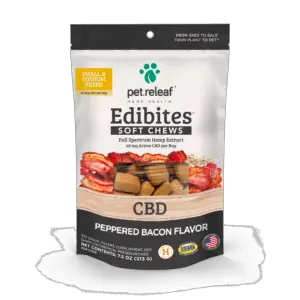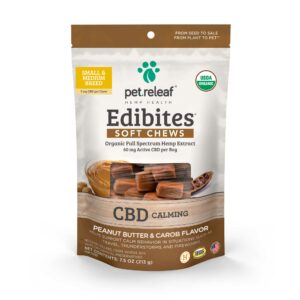
Key points
- Spirulina is a species of cyanobacteria found in lakes, ponds, and other bodies of water.
- It is an excellent source of protein, vitamins, and minerals.
- It’s safe to feed spirulina to your dog as long as you purchase a high-quality supplement.
Today, more and more people are beginning to realize the benefits of wholesome, nutritious, plant-based food. Meat-free and plant-based diets are so popular nowadays that many pet owners are trying to introduce more fruits and veggies into their pets’ diets. Many commercial pet food brands have caught onto the trend and started adding plant-based ingredients to their products or even replacing meat protein in their pet food with protein sourced from grains, lentils, and even insects. Many dog owners also love to add all kinds of superfoods and supplements to their pets’ diets in an attempt to improve their health and make their food even more nutritious. One of these supplements is spirulina.
Table of Contents
What Is Spirulina?
Spirulina is a type of cyanobacteria, or blue-green algae, commonly found in bodies of water. Humans have used spirulina as a source of crucial nutrients for many centuries. But, according to the US National Library of Medicine, the supplement was thrust back into popularity in the 1970s when people started using it to lower blood pressure and cholesterol.

Nutrition specialists laud this green supplement for its rich nutrient content. According to the USDA, one tablespoon or 7 grams of spirulina contains 4 grams of protein and just 20 calories. This cyanobacterium is also high in vitamin B1, B2, and B3 and many minerals, including manganese, iron, potassium, copper, and magnesium. When it comes to human health, it’s hard to overstate this supplement’s benefits and nutritional value. But what about dogs? Is spirulina even safe for them?
Spirulina Safety For Dogs
The good news is that, according to the US Food and Drug Administration, spirulina is generally considered to be safe for dogs. However, there are some caveats – the quality of spirulina matters. Giving your pet a pure supplement that comes from a legitimate manufacturer is the only way to ensure its safety. Low-quality supplements are manufactured under improper conditions, which causes them to become contaminated with heavy metals, microcystins, neurotoxins, and hemotoxins. Instances of contamination are so common that a study published in 2013 showed that over 25% of spirulina supplements contained heavy metals, including mercury, arsenic, lead, and cadmium.

How to choose spirulina supplements for my dog?
Since spirulina is grown in warm water lakes, ponds, and even in the ocean, it’s imperative to purchase only pure supplements from manufacturers who follow proper procedures and thoroughly test their products.
Don’t just purchase the first spirulina brand you see. Try to research the company that manufactured it and make sure that there’s a number or email address you can use to contact the manufacturer. Stay clear of third-party spirulina and instead choose brands that produce the algae themselves. It’s also essential to make sure that you don’t purchase spirulina manufactured in polluted regions of the world. For instance, spirulina made in New Delhi or polluted areas of China will be much more dangerous for your pet than a product made in Australia or the United States.

Another way to ensure that you get a high-quality product is to look for a brand that has been certified by a reputable third-party testing agency. For example, look for supplements approved by the NSF (National Sanitation Foundation), USP (US Pharmacopeial Convention), or NASC (National Animal Supplement Council).
It’s also a good idea to request the product’s Certificate of Analysis (COA) from the company. This document will contain information about the origin of the product and its purity. You should also check the ingredient list of the supplement – it should be free of additives, fillers, preserving agents, and artificial colors. Finally, don’t be cheap. Spirulina is expensive to manufacture, and the price of the supplement should reflect it.
Benefits Of Spirulina For Dogs
It’s full of antioxidants
Antioxidants are a diverse group of compounds that protect our bodies from the harmful effects of oxidation and free radical damage. Essentially, antioxidants protect your pet on a molecular level. And spirulina is full of these miracle substances! This means that the supplement can be highly beneficial for dogs who suffer from heart disease, allergies, or cancer.
It protects the dog’s immune system

The immune system is vital in any organism. But as your dog ages, it becomes even more crucial that its immune system remains strong and healthy. Since spirulina is so rich in nutrients, it has a powerful immunity-boosting effect on dogs.
It’s rich in nutrients
Foods and supplements that contain record levels of nutrients are commonly known as superfoods, and spirulina is definitely at the top of the list of superfoods. This rich green powder is packed with B, C, and E vitamins, protein, and essential fatty acids.
Spirulina can improve the condition of your dog’s coat and skin

As mentioned above, spirulina is rich in essential fatty acids, namely GLA. These nutrients play a huge role in helping your pet maintain a lush, shiny coat and healthy skin. As a result, your pet will look as healthy and radiant as ever.
It can improve digestion
As dogs age, their digestion often takes a turn for the worse. As a result, they may experience flatulence, diarrhea, and other digestive disorders. Due to spirulina’s high fiber content, it can significantly improve your pet’s digestive function and allow it to enjoy its food without any negative consequences. Your pet’s body may even begin to absorb nutrients better as a result.
Administering Spirulina To Dogs
Spirulina is readily available for purchase in health food stores, pet stores, and online. You can select from many convenient product forms, including powders, capsules, tablets. You can also purchase supplements containing an assortment of nutrients and superfoods, including spirulina, in their ingredients.
Unfortunately, giving your pet spirulina is not very easy, as there aren’t any clear guidelines on the supplement dosage in dogs. Scientists have determined that humans can safely consume up to 20 grams of spirulina daily for 2 months or take 10 grams of the supplement for up to 6 months. However, keep in mind that your dog is likely significantly smaller in size than an average human, and its metabolism may be more sensitive to the supplement.
If you want to try giving spirulina to your dog, start by discussing this with your vet. They will be able to tell you about all the pros and cons of the supplement, recommend an appropriate dose, and tell you whether spirulina fits well with your pet’s general health plan.
Tricks to get your dog to eat spirulina
Many dogs refuse to eat spirulina if it’s given directly or mixed with the pet’s kibble because its taste and smell can be somewhat offputting. However, there are a few simple tricks you can use to sneak it into the pet’s diet:
Wet Food
If you usually give your pet dry kibble, you can try giving your pet a little wet food mixed with spirulina from time to time. Your pet will most likely be too excited by this unusual treat to notice the supplement. Plus, pet food has a more pungent smell which can mask spirulina’s odor.
Frozen Treats

Not every pet owner has enough time and skills to make baked dog treats from scratch, but frozen treats are much faster and easier to make. You can find lots of recipes online and mix a little spirulina in the treats before freezing them.
Bone Broth
Most dogs love bone broth so much that they will eat the entire portion before noticing that there’s something else in it. You can give your pet bone broth as a snack or mix it in with the pet’s regular food.
Pill Treats
If the previous three methods failed, try hiding a little bit of spirulina inside a tasty pill treat.
Side Effects of Spirulina in Dogs
While pure, high-quality spirulina is generally safe for healthy dogs, it may cause serious health issues in dogs suffering from some illnesses or taking certain medications. Spirulina is very rich in compounds that can inhibit some cytochrome p450 enzymes. These enzymes play a crucial role in the metabolism of many drugs. This is why it’s vital to consult a vet before trying spirulina to eliminate the possibility of dangerous drug interactions.
Spirulina also may not be suitable for dogs suffering from autoimmune diseases or taking immunomodulating drugs.
Finally, if spirulina supplements you purchased are contaminated with toxic substances, your dog may develop unwanted side effects as a result of ingesting them.
FAQ
Why is spirulina good for dogs?
Spirulina is very high in protein, essential fatty acids, and B vitamins. It’s a nutritious addition to your pet’s diet, which can help strengthen your pet’s immune system and help it combat diseases.
How much spirulina should I give my dog?
Vets still don’t know precisely how much spirulina we should be giving to dogs. To be on the safe side, start by giving your pet ⅛ teaspoon of spirulina per 10 pounds of body weight daily.
Is spirulina good for dogs with kidney disease?
If your pet is suffering from kidney damage and disease, you can give it spirulina supplements to help cleanse the dog’s body of toxins that kidneys would normally remove. Keep in mind that you should never try to treat severe kidney disease with spirulina. Always consult your vet before giving your pet new supplements.
Is organic spirulina safe for dogs?
According to the FDA, yes, if spirulina is not contaminated with neurotoxins, heavy metals, and other harmful substances, it is considered safe for dogs.




